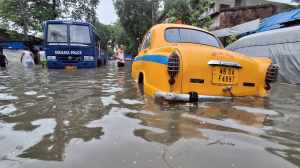ST panel frets as sibling makes most of early start
No rooms. No chairs. No cars. And, if that really matters to anyone, no funds to spend and no tasks to perform.A bizarre division of assets ...

No rooms. No chairs. No cars. And, if that really matters to anyone, no funds to spend and no tasks to perform.
A bizarre division of assets has confined the freshly-minted National Commission of Scheduled Tribes to just a couple of rooms in Loknayak Bhavan, where its members jostle for space with their secretaries. Making itself comfortable in this squeeze is about all the panel is trying to do because it will not be allocated any funds until the elections are over.
Blame it all on the timing of a difficult birth. After a law was passed in December 2002 to split the now-defunct National Commission for Scheduled Castes and Scheduled Tribes into two distinct bodies, more than a year’s gestation followed. Then the panel for Scheduled Castes was was announced last month—about two weeks ahead of its sibling, the panel for Scheduled Tribes—and it became a case of first-come-first-served.
But then, it was always going to be an unequal division. While the original commission consisted of just seven members, each of the two new ones that it made way for has five members—or 10, in all. ‘‘Since the Scheduled Castes commission was formed before us, its members moved in first and occupied the best rooms, took control of the cars and even the staff members,’’ says Lama Lobzang, a member of theScheduled Tribes commission. He sits in a tiny ante-room that he has managed to prise from a private secretary.The SC commission occupies five of the seven original rooms (each comes with an attached staff room), leaving just two to be shared among the five ST members.
Prem Bai Mandavi, the only woman member with the commission, sits in the makeshift office of panel chairman Kunwar Singh since she, unlike her male counterparts, did not venture to grab a temporary office. She is also fortunate enough to share the chairman’s car, while the other members have to divide the only other vehicle among themselves.
In case of cars too, the SC panel drove away with five of the seven vehicles available with the original commission.
While the plight of these individual members may invite both sympathy and sniggers—a state not uncommon in babudom—it has graver ramifications too. All work has ground to a halt.
Says Mandavi: ‘‘We are not taking up any new petitions and we are not hearing old cases since all the files are with the SC commission.’’
Kunwar Singh agrees. ‘‘I guess the commission can function only after the elections are over,’’ he says. ‘‘Right now there are no funds and no staff can be posted as the code of conduct for elections is in force.’’
Photos


- 01
- 02
- 03
- 04
- 05





























